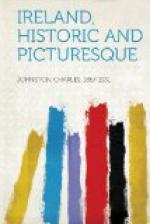Ireland’s bulwark and security.
I found strict morals in age and youth,
I found historians recording truth.
The things I sing of in verse unsmooth
I found them all; I have written sooth.”
The modern form of the names used by the translator gives this version a slightly misleading tone. Ulster, Munster, Leinster were still known by their old names: Ulad, Mumain and Lagin. The Danish termination by which we know them had not been added. In like manner, Dublin in those days and far later was still called At-Cliat, the Ford of the Hurdles. Yet the tribute which the Saxon king paid to Ireland has a true ring. It thoroughly supports what we have said: that incessant tribal warfare rather expressed than detracted from the vigor of the nation’s life. It had this grave defect, however: it so kindled and cherished the instinct of separateness that union in face of a common foe was almost impossible. Long years of adverse fate were needed to merge the keen individual instinct of old into the common consciousness of to-day.
Modern historians generally write as if the onslaught of the Northmen had had this unifying effect; as if it had been a great calamity, overwhelming the country for several centuries, and submerging its original life under a tide of conquest. Here again the history of the time, as recorded year by year in the Annals, leads us to a wholly different conclusion. We find inroads of the Northmen, it is true; but they are only interludes in the old national life of storm and struggle. That enduring tribal conflict, of which we have already seen so much, did not cease even for a year. Nor can it have greatly mattered to the dwellers in some remote valley whether they were sacked, their cattle driven off, and their children taken captive by strangers or by men of their own land.
There was one chief difference: the foreigners, being still heathens, did not spare the churches and the schools. The golden or silver reliquaries, the jeweled manuscript-cases, the offerings of precious stones and rich ornaments laid on the altars: these things proved an irresistible temptation to the roving sea-kings. They often burned or cast away the manuscripts, eager only to take the jeweled coverings, and in this way many monuments of the olden time have been lost, and many gaps in the history of the nation made irreparable. Yet it would seem that even the loss of manuscripts has been exaggerated, since such lavish abundance remains to us from the times before the first northern raiders came. Many a remote shrine was never even approached by the northern wanderers; and, in the long times of peace between raid and raid, one school had time to gain from another copies of the books which were lost. We may hope that the somewhat rigid views of copyright expressed in the matter of St. Finian’s Psalter were not invariably adhered to. We have Chronicles kept with unbroken regularity year by year through the whole of the epoch of Northern raids, and they by no means indicate a period of national depression, nor justify us in thinking of these raids as much more than episodes in the general fighting of the nation,—the martial state through which every modern country has passed before emerging to homogeneous life.




